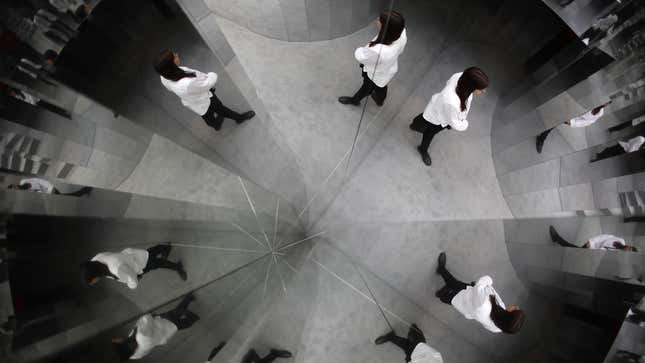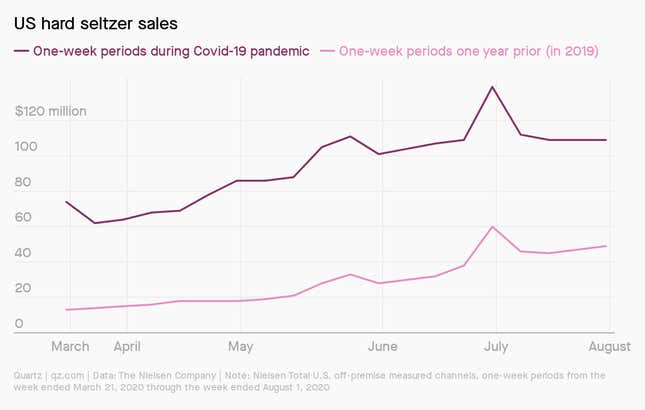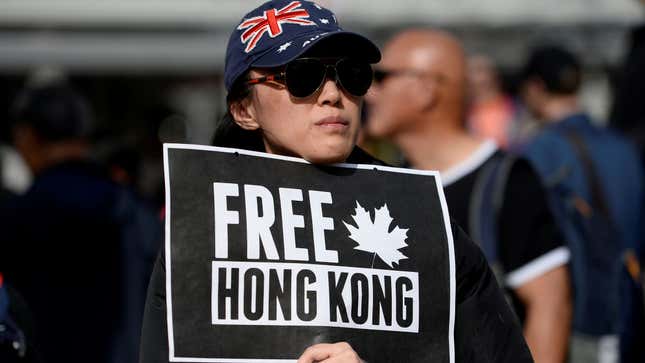Good morning, Quartz readers!
Here’s what you need to know
Asia’s GDP declines failed to pull down markets. Japan’s 28% economic contraction and Thailand’s 12% GDP drop year-over-year in the second quarter were the worst in decades, but global equities climbed on Monday. Private market heavyweight SoftBank has stepped into the publicly traded ring with investments in Amazon, Tesla, and Netflix, while Robinhood, Kabbage, and Aviation Gin cleaned up in the private markets. Even Bitcoin crushed it—and Citi is giving money away.
Huawei CFO Meng Wanzhou continued to fight her extradition to the US. As proceedings in the case resumed Monday, Meng’s lawyers argued she was the victim of a conspiracy between American and Canadian law agencies. Meanwhile, the US Commerce Department made it even harder for Huawei to purchase chips with American-made components, and the Trump administration is considering banning more Chinese apps on national security concerns. Despite a looming ban, TikTok signed a music distribution deal with UnitedMasters.
India’s used car sales took off. Demand has soared for pre-owned autos and two-wheeled vehicles as Indians have grown leery of crowded public transportation during the pandemic. Meanwhile, busloads of migrants are coming back to cities in search of work, even as the country topped 50,000 coronavirus deaths.
The pandemic has also been good for JD.com’s sales. The Chinese ecommerce company reported a 33.5% increase in quarterly net product revenue, which includes online retail sales. China’s Geely Auto, on the other hand, saw its half-year profit plunge 43%, and dronemaker DJI has axed over 100 jobs.
Obsession interlude
To understand a Quartz Obsession, it always helps to check the numbers. Here are some figures that help explain The Climate Economy:
$7 per ton: The so-called “social cost of carbon” established during the Trump administration, slashed by a factor of seven from its Obama-era value. Reducing its value makes it easier to justify federal decisions that increase emissions.
~$45: The price of a barrel of Brent crude, the international oil benchmark. Prices have stalled after bouncing back from a precipitous drop in April, which is just fine by OPEC producers that want to put the hurt on their US competitors.
83%: How much the cost of electricity from a solar power plant has fallen in the last decade.
$68 billion: Global damage from natural disasters in the first half of 2020.
1.7: Number of Earths it takes to sustain today’s global level of consumption of natural capital.
Go deeper with our field guide to fossil fuels, or keep tabs on The Climate Economy here.
Detox for bureaucrats

So many of us work in organizations that are fainthearted and dispiriting. Often, the culprit is bureaucracy—a massive multiplayer game that pits players against one another in a battle for positional power and the rewards that come with it.
What does detox for bureaucrats look like? Not surprisingly, it looks a lot like other recovery programs. Taking a page from Alcoholics Anonymous, these 12 questions can help break the bureaucracy and resurface your humanity:
Did I subtly undermine a rival? In the battle to move ahead, it’s tempting to discount the contributions of others.
Did I hold onto power when I should have shared it? To justify their superior status, managers face a disincentive to share authority.
Did I pad a budget or exaggerate a business case? Resource allocation in a bureaucracy is conservative so it’s tempting to bid for more resources than you need.
Complete the questionnaire on Quartz at Work.
Charting the hard seltzer bubble
Hard seltzer was a $2 billion business in the 22-week US “pandemic period” beginning March 2, according to Nielsen data. And while beer sales were up about 11% compared to the same period last year, hard seltzer sales were up 224%.

Brands such as White Claw and Truly that are unaffiliated with big beer labels currently control about 75% of the hard seltzer market, but major players are coming. Bud Light Seltzer and Corona Seltzer both launched in 2020, and in July Coca-Cola announced that Topo Chico hard seltzer is around the corner for select Latin American markets, which means hard seltzer is angling to be the drink of many seasons to come.
The global fight for Hong Kong

The fight for Hong Kong has become the world’s fight. The pro-democracy movement’s international lobbying network has succeeded in going beyond photo ops to leverage the momentum of the protests into tangible political influence worldwide. Key members of Hong Kong’s global influence campaign include:
🇬🇧 In the UK: Hong Kong Watch, Fight for Freedom, Stand with Hong Kong, and the Inter-Parliamentary Alliance on China, as well as activists Luke de Pulford and Nathan Law.
🇺🇸 In the US: The Hong Kong Democracy Council founded by Samuel Chu.
🇨🇦 In Canada: Torontonian Hong Kongers Action Group, and Alliance Canada HK.
Quartz spoke with activists from all of these groups and beyond to discover how the battle over Hong Kong’s freedoms went global in our latest field guide.
✦ And there’s never been a better time to activate a Quartz membership. We’re offering a 40% discount on your first year.
You asked about antibodies
What is the value in antibody testing? Other than being able to donate plasma, one could take riskier behaviors with a positive (or false positive) test result.
Great question, reader. You’re right—there’s not a ton of value in an antibody test for an individual if they’re hoping to use it to guide their own behavior. That’s because antibody test results have the potential to give false results, even when the stated accuracy of the test is high (the statistical reasons why are pretty fascinating!). But that doesn’t mean antibody tests are useless: In aggregate, their results are helping scientists and public health officials understand how long Covid-19 immunity lasts, which is still an open question.
Surprising discoveries
Virginia’s “Lost Colony” was never really lost. Newly published research claims the residents of Roanoke just moved in with their Native American allies.
Betelgeuse burped. Astronomers determined the star let loose a gas cloud that cooled to dust, obscuring the red giant’s usual brightness.
California may have set a new global temperature record. The recording of 130°F (54.4°C) in Death Valley could be the hottest ever.
A new way to secure the bag. A much-hyped New York fashion label introduced a “bag security program” that promises all shoppers one of its coveted handbags—if you can wait six months.
A pandemic pilgrimage pause pumped Pakistan’s purse. Despite fears of flagging remittances, a drop in Hajj spending contributed to the biggest-ever month for overseas transfers.
Our best wishes for a productive day. Please send any news, comments, securitized sacks, and Pakistani rupees burning a hole in your pocket to hi@qz.com. Get the most out of Quartz by downloading our app on iOS and becoming a member. Today’s Daily Brief was brought to you by Liz Webber, Jackie Bischof, Jenni Avins, Katie Palmer, and Max Lockie.